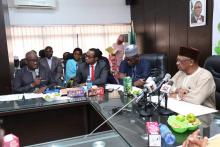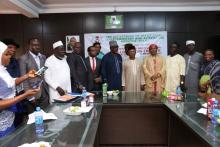Minister of Health assures Traditional Medicine Practitioners of Intellectual Property Rights
Abuja, 31 August, 2018 - Minister of State for Health, Dr Osagie Ehanire has assured traditional medicine practitioners in Nigeria of the protection of their intellectual property rights for products that support government effort towards universal health coverage.
The minister made the pledge during a press briefing on 31 August 2018 to mark the 16th edition of the African Traditional Medicine Day with the theme “Local Manufacturing of Traditional Medicine Products in the African Region,” in Abuja where he emphasized the need to promote and enhance local manufacturing of traditional medicines for better access to quality-assured medication.
“Nigeria has over 8,000 plant species with potential benefits in ethno-medicine or ethno-pharmacy and that up to 70% of Nigerians use Traditional Medicine, either wholly or in combined with modern drugs” he added.
Also speaking at the event, the representative of traditional medicine practitioners in Nigeria revealed that there are a number of Nigerian traditional medicine products marketed and sold outside the country but are not in the database due to lack of specific regulation in practice. He appealed for collaboration between Federal Ministry of Health and National Agency for Food Drug Administration and Control (NAFDAC), for the registration of such medicines and maintaining record of the drugs.
On his part, WHO Country Representative (WR), Dr Alemu Wondimagegnehu said traditional medicine products require a political, regulatory and economic environment, which will enable local manufacturing. He pointed out that stronger public-private partnerships would boost investments in local manufacturing of medicinal products and help to protect against financial risk by improving economic and social development.
Represented by Dr Tayo Hamzat, WR said, “To support investment and technology transfer, WHO is partnering countries, to assess the need for manufacturing traditional medicine products locally for some priority diseases”.
In Nigeria, WHO had supported the development of the Traditional Medicine policy and have assisted the department of Food and Drug Services as well as built capacity of the staff on traditional, complementary and alternative medicines. WHO also facilitated the study on situation analysis of Traditional Medicine in Nigeria and the publication of the Nigeria Traditional Medicine pharmacopoeia.
Kindly follow us on Social Media:


